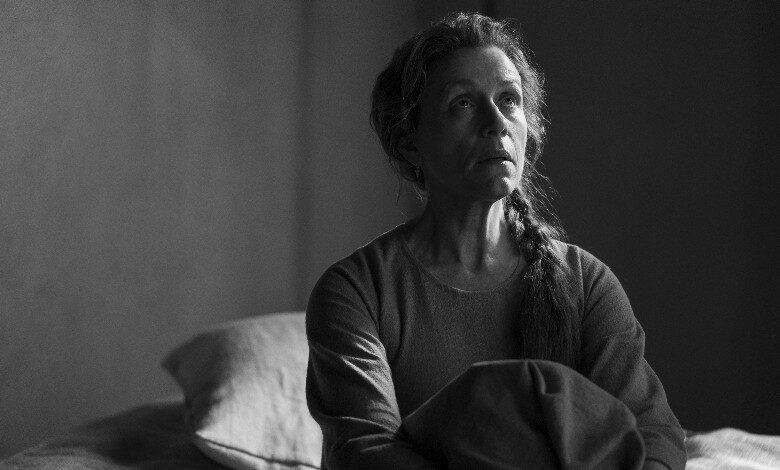
Joel Coen’s “The Tragedy of Macbeth” is the first film he hasn’t directed with his equally celebrated brother, Ethan Coen.
Rather than feeling like a half a movie from only one of the most distinct and consistently brilliant filmmaking teams in America, Joel Coen’s film is a work of genius.
The story remains as William Shakespeare intended; It’s how the story is told that feels entirely new.
Denzel Washington plays Macbeth as a servant to King Duncan (played by Brendan Gleason) and tires of being overlooked. The prophecy of three witches (all played by Kathryn Hunter) reveals Macbeth to gain the throne. Through the counsel of Lady Macbeth (played by Frances McDormand) and a willingness to obtain power through murder most foul, Macbeth’s moral compromise sets in motion an ascendence in royalty, at the cost of his soul.
Visually, this resembles an early Orson Welles film or a work of German expressionism (think Fritz Lang’s “M.” or Robert Wiene’s “The Cabinet of Doctor Caligari”). There’s a feeling of discovery to every scene, as even the scene transitions (artful, clever fades that rearrange the shape of the setting but, like great stage direction, convey the stark, nightmarish perspective of Macbeth’s mind) are amazing.
Washington doesn’t overplay or become demonstrative, in what could have simply become a stage performance. In fact, he keeps his facial reactions neutral for the first act and allows the words to have their power. His recitations are straight forward and unforced.
RELATED: “Miller’s Crossing” at 30: The Film That Changed Everything for the Coen’s
Washington’s passion for theater, which he often returns to in between film roles, is extended into his work here.
McDormand doesn’t play Lady Macbeth as expected, as there is an understated quality to the kind of opportunist she portrays. It’s a decision that doesn’t always connect, though, like her co-star, McDormand is visibly avoiding the temptation to go over the top and keep her work at a steady tempo.
At least Washington and McDormand have solid chemistry and find the desperation in their roles. To say the least, the film lives up to the promise of seeing two awe inspiring Oscar winners give depth and great feeling to their legendary characters.
Inside Joel Coen’s solo venture, after a career co-directing with his brother Ethan, to film Shakespeare’s “Macbeth” with Denzel Washington and Frances McDormand. https://t.co/DuiuOdCUu2
— Los Angeles Times (@latimes) January 7, 2022
Gleason is so terrific here, giving such fire to his recitations and it’s fun to watch Stephen Root somehow fully embody his one-scene part but also give the kind of offbeat character turn you’d expect in a film directed by a Coen brother.
Then there’s Hunter, who makes The Witch a scary, intimidating presence and portrays multiple roles as well; it’s a tour de force but so clever a ruse, I had to have her additional roles pointed out to me.
Among the many legendary lines that spring up: “Is this a dagger I see before me?”, “Unsex me,” “By the pricking of my thumbs, something wicked this way comes,” “Out damned spot,” and “Double, double, toil and trouble, fire burn and cauldron bubble.”
The costumes, sets, cinematography, sound and Carter Burwell’s thrilling score are all awards worthy.
The thundering drops of water are a reminder of the final image in “Blood Simple” (1985), Coen’s debut film, and it’s a perfect callback here. Even without his brother Ethan, Joel Coen is firing on all cylinders.
For the uninitiated or casual viewer, it will be a lot to absorb. I recommend a primer, whether a synopsis of Shakespeare’s play or even a revisit of the well-executed Michael Fassbender/ Marion Cotillard version from 2015.
Shakespearean purists will undoubtedly debate whether this is among the definitive versions of the play, though Akira Kurosawa’s “Throne of Blood” remains that way for me. In terms of style, boldness and the achievement of ambition all around, Coen’s film is comparable.
While too many films are ready made for viewing on a laptop, “The Tragedy of Macbeth” is profoundly and defiantly cinematic, naturally integrating the theatrical and reshaping a classic, bloody tale with a newfound life.
The presence of sparrows suggests the evil and madness that is swirling around the characters, and Shakespeare’s cautionary tale has been recalibrated by Coen to resemble a gorgeous nightmare. This isn’t “concept Shakespeare” or a gimmicky, self-consciously artsy experiment but a thoughtfully constructed vision.
Simply put, it’s awesome.
Five Stars
